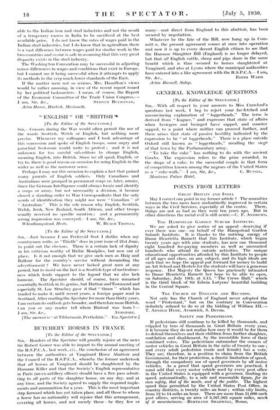" ENGLISH " OR " BRITISH 4 .
[To the Editor of the SPECTATOR.] Sur,—Censors during the War would often permit the use of the words Scottish, Welsh or English, but nothing more precise. Whenever my colleagues and I took advantage of this concession and spoke of English troops, some angry and parochial Scotsman would write to protest ; and it is not unknown for too careful sub-editors to change English, meaning English, into British. Since we all speak English, or try to, there is good reason on occasion for using English in the wider as well as the narrower sense.
Perhaps I may use this occasion to explain a fact that pained many parents of English soldiers. Only Canadians and Australians were grouped in permanent corps or, later, armies. Since the German Intelligence could always locate and identify a corps or army, but not necessarily a division, it became almost a standing order to War Correspondents that the only words of identification they might use were " Canadian " or " Australian." This is the sole reason why English, Scottish, Welsh, Irish, New Zealand, South African, and other troops usually received no specific mention ; and a permanently wrong impression was conveyed.-1 am, Sir, &c.,










































 Previous page
Previous page